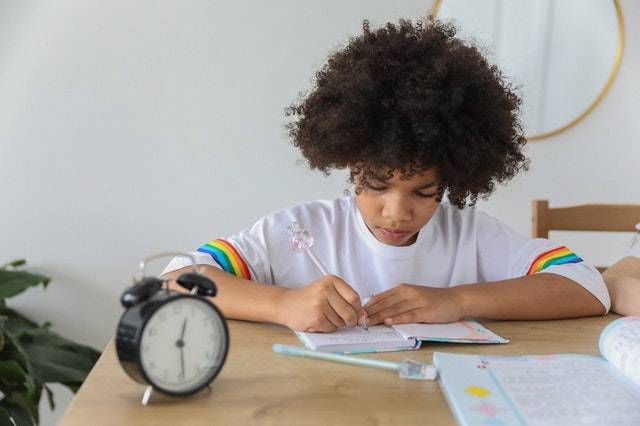Dear Diary: How Can Journaling Improve Children’s Health?

Do you recall the magical time of teens when you were completely overwhelmed with emotions so that you needed a new means of self-expression? Maybe you called it an intimate diary, and like most of them, it was probably coming with a leather or vinyl cover, many empty pages, and maybe even a padlock with a key. If, on the contrary, you are one of those parents who have never kept a diary in their childhood or adolescence, you should know that even the plainest notebook accompanied with a pen is an effective tool for helping children regulate their emotions and articulate their thoughts.
Amazing benefits of journaling
Having a diary is a super idea for children who are reluctant to talk so they can have their own private space to note their thoughts. It can also be very useful as a teaching tool when children face difficulties in one of the school subjects. For example, they can start a mathematics diary where they can share the difficulties with the concepts as well as the formulas and how they manage to overcome the obstacle. Reviewing the pieces of these notes later will not only cement the learning process and improve its understanding but also will add a pinch of nostalgic joy. Unconditionally, keeping a diary would be a considerable benefit for children who are going through tumultuous times emotionally or psychologically. It is an excellent way of introspection without judgement. Ok, but what are the real benefits of keeping a diary? Check out down below!
- Increase communication and writing skills – suffice it to say that incessant writing is the best way to hone communication skills, and regular diary maintenance is great for building a clear communication by writing. The earlier the children start to keep a diary, the better they write: it is clear and with fewer mistakes.
- Makes writing interesting – obviously, in the eyes of a child who is not used to expressing himself on paper, every writing task will be seen as a tough challenge or even a terrible ordeal and it is not only limited to homework at school or academic work at college. Think of future professional advancement for your offspring. Nowadays there is always professional assistance from a resume editor, but what about personal style and character? A habit of keeping a diary will change such a pessimistic attitude to pen and paper but will bring to light a child’s inner zest. When regular, this practice will prove that writing is fun, especially when it comes to pleasant supplies like images, stickers, doodles, and even objects.
- Improve reading and understanding of the text – children should master the ability to read and quickly understand the content. The maintenance of a diary stimulates the child to replenish the vocabulary, as well as the correct sentence building. Thanks to this, the child has a read speed, as well as the ability to get the drift on the fly.
- Stimulates creativity – ever heard that creativity is a fuel of success? In fact, that’s a general denominator for all noble leaders, sciences, and entrepreneurs. Speaking about the last category, Henry Ford, a major figurу that needs no introduction, once stated:” If I had asked people what they wanted, they would have said faster horses.” Thinking out of the box, that’s always the key. Very few people ponder over the fact that journaling, in the form of narration, establishes neuronal pathways in the brain that are associated with creativity. By giving your child regular history prompts that involve problem solving, you can develop his creative reflection capabilities.
- See things from different angles – journaling helps build the process of reflection by helping children make a realistic assessment of a past situation and see it from several angles. This is a very useful skill to rationalize its position or write an argumentative trial. This ability to see from different angles in fact qualifies traders in the workplace or wherever they go and facilitates the situation.
- Significant expression of thoughts – when keeping a diary, children have the opportunity to express their thoughts and emotions that results more meaningfully. In the long run, this is reflected in their ability to write an article or test in a very structured and logical way. This writing competence is essential to success in high school and college, as the writing of testing is a key element of the courses.
- Improves attention to detail – while writing thoughts, every detail must be captured in the context of what is written. This reinforces the child’s observation capabilities and its ability to remember details significantly. This can also often lead to recovering information that may have been missed before. Journaling also emphasizes spelling and vocabulary.
How to make your child captivated with the diary?
Like it or not but children usually couldn’t care less about the benefits. Besides, keeping a diary in the early days demands a bit of effort: conscientiousness, thoroughnessб and consistency. You might probably be sitting there wondering: “So how on Earth am I supposed to get my little one interested in journaling?”. Have no worries, it’s a lot easier than it seems given children’s excessive emotionality.
- Give a diary as a gift – notebooks in a spiral binding with pencils is the easiest option, but if the child prefers something more bizarre, finding the diary that will have to do with the soul, will not be difficult.
- Buy a kit of spectacular stationery – this moment can not be overlooked, because the meaning of the diary is that it is fun and interesting. Go along with the child to the stationery store and allow it to choose what the child prefers the most.
- Give your child freedom of creativity – too many hard rules regarding how the diary should be, can only scare off and discourage the child. Enlighten the child about the main points that are desirable in the diary ( like date, title, general structure), and then – let the baby continue on its own.
- Set an example – the best way to captivate a child is to lead your own diary. Children love to imitate their parents, and seeing how you write is a strong motivation.
What kind of diary to choose for a child?
In addition to the usual personal diaries, in which the child records all events of daily routine, you can offer another format of records. Just take a look at this plethora of ideas!

- Natural diary – this kind of diary will not only stimulate your child to reflect and encourage its creativity but also hone drawing and observational skills. The diary can be decorated for all tastes: a child may want to include photos of insects, drawings of leaves and flowers, description of animals and their behavior, as well as other fascinating products of art.
- Emotional diary – the sense magazine may include both text description and images characterizing the state of emotions. This is a great way to expand emotional vocabulary, as well as specify your feelings. The child can also choose the feeling-emotion wheel as a base or poster clipping, or find other ways to express its state of the soul.
- Thematic diary – this type of diary serves as a keeper of regular writing on a random theme. For example, if a child goes to a zoo with his parents, an alligator can be chosen as a “hero of the day”: what is it like an alligator as a pet?
Journaling is one of the best habits that you can grow with your children and bring huge long-term rewards in terms of academic success and personal fulfillment. With a diary writing ideas for the children mentioned in this article, you can easily stimulate your child into the activity.
Author Bio: Carmella Andersson works as a copywriter for Resume On Time. It gives her an opportunity to improve her critical and creative thinking skills.

